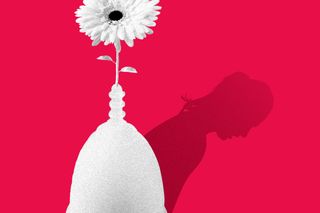
How the Conversation Around Sustainable Menstrual Products Ignores Autonomy, Health
Making environmentally conscious menstrual decisions should be a matter of personal choice, but it has been hijacked by virtue signaling and corporate agenda.

Over the past decade, a growing emphasis on sustainability has spurred a push for eco-friendly period products – with menstrual cups becoming the poster child of the movement. In comparison to the amount of waste generated due to disposable period products – like pads and tampons – menstrual cups are likely a more sustainable alternative. However, the widespread societal pressure to embrace these products as an ethical choice is beginning to undermine the individual autonomy of female bodies. In short, those who choose not to opt for these products are labeled “unethical” or “lazy” – with no regard to why that choice was made.
“I just encountered someone online who said that women who 'claim they can't use menstrual cups just aren't trying hard enough or don't care – if it can push out a baby, it can certainly fit a menstrual cup,’” wrote a Reddit user.
This patronizing tone is perpetuated – and perhaps even led by – advertising campaigns for new-age period products: “Women should upgrade with the progressing world and opt for comfortable menstrual experiences,” reads one – ignoring, among other things, the basic fact that not everyone who menstruates is a woman.
Another underlying assumption is that these options are universally suitable for all menstruators. However, this assumption is flawed and overlooks the intricate nuances of individual bodies and experiences. Not only can menstrual cups cause physical discomfort, but can also trigger emotional distress for individuals with a history of sexual abuse or health conditions.
“I guess I'll just jam a cup up there despite my issues with vaginismus; screaming and crying is worth it to save the planet, right? People with vulvodynia, very low cervix septate, a microperforated hymen… trauma, scar tissue, or dysphoria should just 'try harder,' apparently! And for the people with disabilities and mobility issues who physically can't reach or don't have the necessary dexterity? 'Try harder' to... not be so disabled?” the Reddit user continued, adding: “Personally, for me, it just reminded me that my vagina is fu*king broken, and I'm already painfully (literally) aware of that fact.”
The hailed menstrual cup has a lesser-promoted sustainable sibling: the period panty. They aren’t intrusive like cups and act much like sanitary napkins – except, they can be washed and reused. But as journalist Ruby Topalian argues, “A reusable sanitary pad almost feels like a step back for women as far as convenience and practicality is concerned… given the discomfort and inconvenience of cloth pads, and growing expectations that women would work and attend school with their usual efficiency all month, [disposable pads] became a sensation soon after its release… Why would we revert to a period product that made the lives of our ancestors more difficult?”
How the Morning‑After Pill Became the Most‑Used Birth Control for Young Indian Women
Further, with research showing how women are already more burnt out than men – as a result of repeatedly having to prove themselves at work due to existing gender biases while performing the lion’s share of domestic labor – shaming them into adding washing and drying reusable pads to their to-do lists might be environmentally progressive but socially regressive.
The implicit coercion embedded in the fervent advertising and advocacy surrounding sustainable period products thus feels like yet another frontier to exercise control over female bodies; this time, under the guise of sustainability.
“Nearly every single cis woman knows the struggle of ‘that time of the month.’ The cramps, the headaches, the bloating, the cravings, the mood swings, the random spells of nausea. And now, as if women aren’t already torn apart for everything that we do, I was staring at a poster that made me feel guilty for not thinking more about how I approached those seven days of agony,” says Topalian.
The conversation around sustainable menstrual products is yet another instance of corporate blame-shifting, “the corporate strategy of shifting blame to consumers [in] an attempt to distract from the political change that is required for real progress to be made.” Menstrual product companies – seeking to bolster their public image and align with trending environmental causes – have thus begun employing aggressive marketing tactics to manipulate consumer choices. And well-meaning activists and consumers, too, appear to have fallen prey to corporate tactics.
It’s undoubtedly important to spread awareness about sustainable period products – especially since even talking about periods still remains taboo in several pockets of the world. However, when the choice of switching to sustainable options is peddled as a moral obligation, it exacerbates and perpetuates the guilt and shame around periods.
“People who can’t or choose not to use them are shamed by fellow menstruators who evangelize about menstrual cups and wave their eco credentials at us. It’s there in the ads and the Instagram posts,” notes Quinn Rhodes, a queer, trans writer living with vaginismus. “This is what companies want us to think… Empowerment can be found in menstrual cups, we’re told, not in making the choices that work for us… It’s the kind of white feminism that doesn’t consider that not every woman’s body or struggles are the same.”
Moreover, menstrual cups – like almost everything else – come with their fair share of risks. While they’re certainly avoidable through education and awareness, the fact remains that in glorifying menstrual cups as the savior of humankind itself, these risks are frequently glossed over. For example, menstrual cups can – and do – dislodge IUDs, thus leading to unwanted pregnancies.
Pre-Menstrual Exacerbation Is Debilitating. Why Doesn't Anybody Know About It?
“I was told when I got my IUD that the medical field is aware of a lot of anecdotal evidence of the cup suctioning out the IUD, but it hasn't been researched enough to be conclusive. I was advised to stop using mine,” noted one individual. While another said: “I was just told ‘so, before you move your cup, be absolutely sure you've broken the suction. Otherwise, you could dislodge it.’ I'd been using a cup for [six] fu*king months [by then]... Like, a little more warning, please?”
Then, there’s the matter of cost. Even menstrual cup manufacturers agree that their products – like other reusable period products – have a higher one-time cost. Granted that the costs of disposable pads and tampons one can rake up over the course of their life are much higher. But that doesn’t mean everyone can afford that upfront one-time cost – especially since determining which cup is right for someone usually takes trial and error. “For the people who can't afford to collect cups until they find 'the one,' should they just 'try harder' to not be poor, too?” commented the aforementioned Reddit user. Not to mention, we live in a world where period poverty exists and people can barely even afford disposable pads; many adolescent students in parts of India itself have to miss school while they’re menstruating because they don’t have the money to buy pads.
Furthermore, some researchers argue that period products marketed as more sustainable might not actually be so. “For hygienic reasons, the cup must be cleaned regularly with soap and water and boiled for disinfection. If you don’t include cup cleaning, the answer to the question of the environmental friendliness of the two alternatives is quickly done: over 200 tampons (and the waste they generate) are compared to just one small cup that can be used over and over again over a long period of time. Prematurely, manufacturers and consumers conclude that the cups must be better,” notes an article, concluding that it’s actually impossible to determine whether menstrual cups are indeed that much better for the environment. “There are no representative public studies on the quantities of water used or recommended for hygienic reasons. Nor do the manufacturers provide any quantity data on this subject or make any specific recommendations. A consumer survey [to estimate] quantities of water used by cup users [suggested] quantities stated vary considerably… there is no black or white, but many nuances in between.”
Although there exist disposable period products that may be truly sustainable – often plant-based, biodegradable, and compostable, they are, unfortunately, quite expensive.
Recognizing and respecting the diverse needs and experiences of menstruators should be the cornerstone of any advocacy for sustainable period products – a fact that’s easily forgotten in the tussle between caring for the environment and exercising bodily agency.
As Topalian writes, “Let’s bridge the gap between environmentalism and feminism to fight the patriarchy, make period products an industry that puts women before profit, and provide women with a truly viable environmental alternative that makes all of our lives easier when the dreaded time of the month comes around, without the guilt-tripping.”
Devrupa Rakshit is an Associate Editor at The Swaddle. She is a lawyer by education, a poet by accident, a painter by shaukh, and autistic by birth. You can find her on Instagram @devruparakshit.
Related


It’s Not Cute To Dissociate, Despite What the Internet Makes It Look Like
.png?rect=0,80,1280,1280&w=320&h=320&fit=min&auto=format)